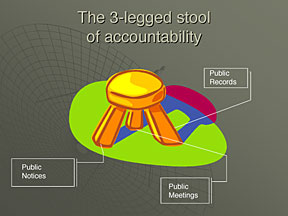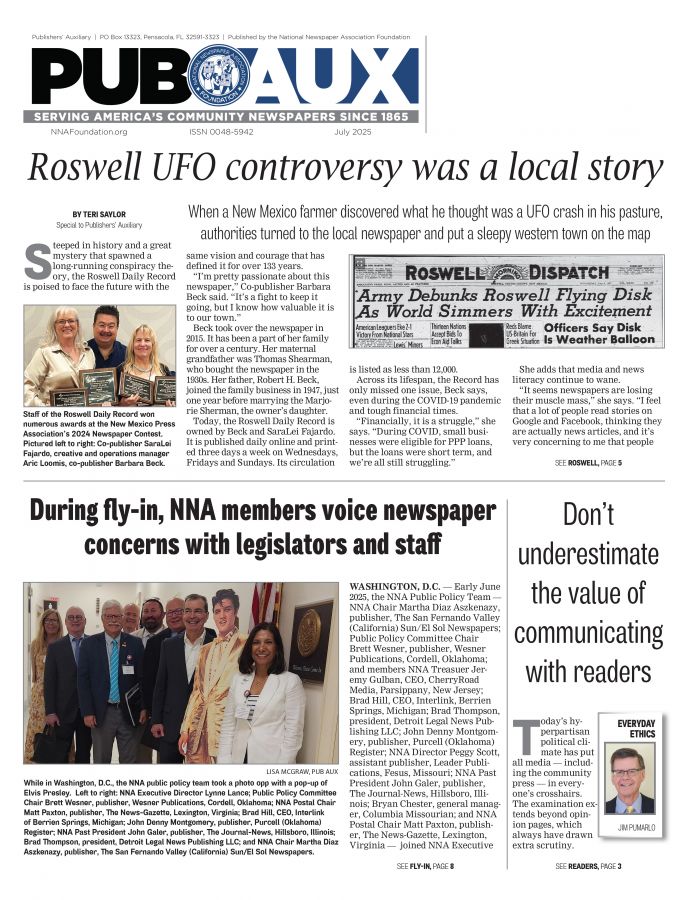Leave ‘legals’ alone
Oct 30, 2020
STEVEN R. PECK
Wyoming legislators have been working this fall on further erosion of public notices in newspapers.
This time the target is the publication of the salaries of local government employees. A bill changing state law so that those no longer have to be published is in the works. A committee passed it in September.
As it stands now, our taxpayer-funded municipal governments, county governments and public school districts must, at the very least, publish a list of positions and how much the people who hold them are paid. In some cases, the actual names of the jobholders must be published, as well.
Numerous other public notice requirements already have been eliminated. There is a lot less public notice advertising than there used to be. Yes, of course, that hurts the newspapers.
The superficial justification always is money. The governments claim it simply costs too much money to inform the public of its own business. The advent of the Internet over the past quarter century has given public entities a new battering ram against public notice advertising via arguments that this information will simply be put on a “local government website” instead of in the newspapers — knowing full well that far fewer people would ever see the information. And that satisfies a deeper motivation: secrecy.
But with Wyoming’s fiscal profile in tatters, those who would do away with public notice advertising for reasons of secrecy feel they have a stronger argument based on money. This time around, they feel they can simply ignore the service and accountability consequences of their proposed changes and concentrate solely on the financial aspect — and be more likely to get away with it.
Public notice advertisements are required by law. The laws requiring them were initiated and passed by the Wyoming Legislature. The newspapers didn’t push for them. They were created to help ensure at least the appearance of proper, transparent, responsible and accountable government.
That’s the deal we made with governments and that governments made with us. It would be unfair and unwise to the papers to require them to publish the information without being paid. This has formed a successful partnership between the government, which needs to make the information public, and the papers, which can guarantee an attentive audience and an accurate, independent performance of the duty.
If this partnership is broken, a huge measure of public confidence in its government will be lost. Without the independent newspaper publishing the information for all to see, public assurances that the information is being reported accurately and retained securely is hugely undermined.
It is a convenient myth to presume that a private website operated by the government entity itself can or would do a proper job of making this vital information available to the public — or that the information would be seen by as many people as see it now.
But it’s absurd to think that average citizens, long accustomed to seeing the business of their local governments presented conspicuously and clearly in the local papers alongside the news, ads and amusements they pay to receive, will navigate a government website for the purpose. They just won’t do it, a fact proven in many studies and analyses. And this means more information will fail to reach the eyes and minds of the people who need to see it most.
As for money, our newspaper business could, literally, have made millions more dollars over the past 70 years by requiring the governments to pay what the retail advertisers pay.
But we don’t. We charge much less. That’s our part of the public service.
Further, government leaders who would prefer that their information be kept a secret or deeply locked away love to claim the convenience of “unfunded mandates” when talking about public notice advertising. To this, we remind the public that it is the governments who created this mandate, not the papers, and it is the governments which have the taxation authority to pay for virtually anything they want.
We and other newspapers in Wyoming would welcome the assignment to examine all government spending and weigh each and every expenditure against the low cost and high value of public notice advertising. There are many other ways to save money which not only would hardly be noticed by the public but might even be beneficial.
One last thing: Ask any newspaper reader if he or she would be glad to see the “legals” eliminated from the local paper. Study after independent study shows that the public likes having the legal notices in the paper and would be both resentful and deeply suspicious if they were removed.
So, our message today to the legislators is simple: Don’t do this. Don’t continue to chip away at this crucial part of your government duty.
And a concurrent message to our newspaper readers: Contact your lawmakers and tell them not to do it. Tell them you like the legals in the paper, and demand that the lawmakers leave them alone.
Steven R. Peck is the publisher of the Riverton Ranger Inc. in Riverton, Wyoming. The family-owned business publishers the daily Ranger, weekly Lander Journal, weekly Wind River News, EXTRA! and the Advertiser.










